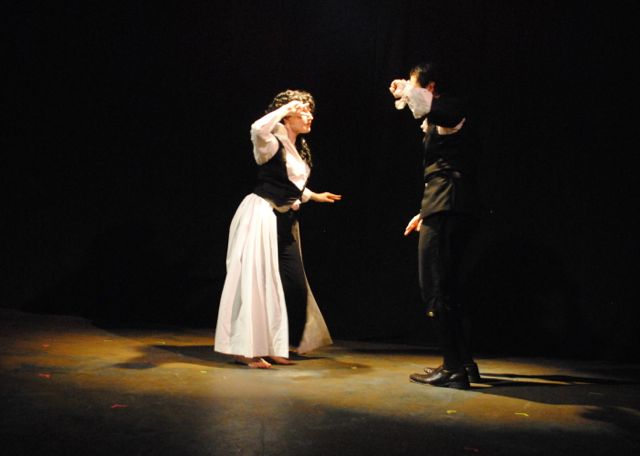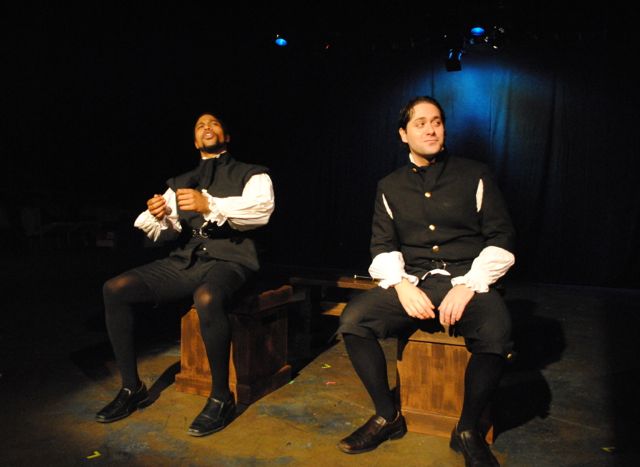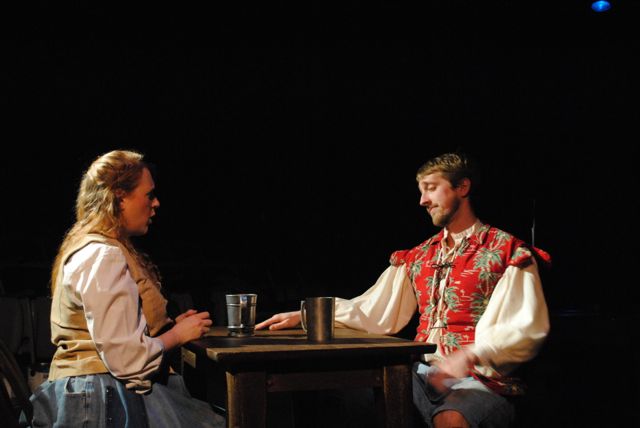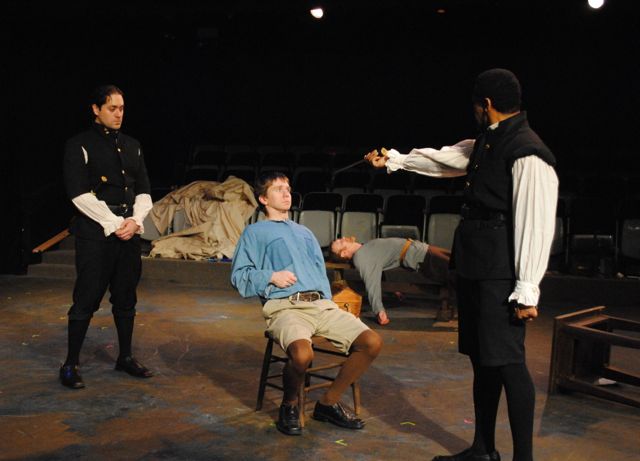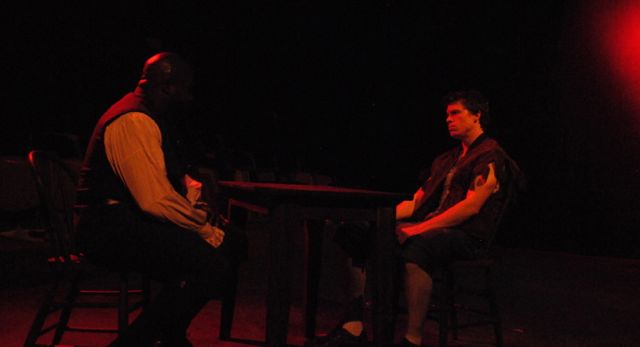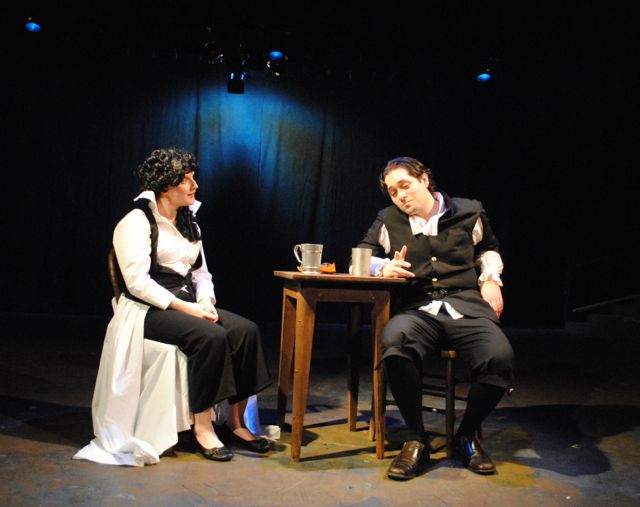Bard Fiction Gets Medieval, Blends Tarantino With Shakespeare
By Samantha Abernethy in Arts & Entertainment on Mar 16, 2012 7:40PM
The folks who brought you A Klingon Christmas Carol have now created a Shakespearean adaptation of Quentin Tarantino's Pulp Fiction. Bard Fiction blends the "motherfuckers" and "bitch, be cool" lines of Tarantino with the "thou art" and "maiden fair" of 17th century England. All the violence is still there, too. Instead of pistols and shotguns, the main characters Jules and Vincent carry daggers and broadswords.
Christopher O. Kidder is the stage director for Bard Fiction and artistic director for Commedia Beauregard, which does exclusively translations of plays including Polish, French, German, Czech and Spanish. Kidder and Commedia Beauregard relocated to Chicago and brought A Klingon Christmas Carol to Chicago in 2010. This is the group's first full season at the Greenhouse Theater Center in Lincoln Park.
Bard Fiction was first presented in an abridged fashion at the Minnesota Fringe Festival in 2009. It was developed by Ben Tallen, Aaron Greer, Brian Watson-Jones in collaboration with the "Pulp Bard" wikispace. The action takes place in 1609, and the play is written as if it were 1614.
The adaptation is thorough, even through the technical details. Costume designer kClare Kemock took painstaking measures to create hybrid costumes that ensure the costumes reflected the colors and textures of Pulp Fiction, while using the silhouettes of the time period. Eric Von Tassel was careful to incorporate the same colors of Pulp Fiction into the set pieces. The music is exactly the same songs used with each scene from the movie, except they're performed with mandolins and lutes in a Medieval style, performed by the group Il Troubadore.
The storyline is faithful to the original film with a few Shakespearean twists. Christopher Walken's character, which exists in a flashback in the film, appears as a ghost in the play. Any use of cell phones in the film is replaced with a messenger, cleverly named Sprint. There were no hamburgers or McDonald's in 17th century England, of course. Instead Jules and Vincent discuss what cottage pie is called in France — hachis parmentier.
There is one piece of text that is unchanged from the original screenplay: Samuel L. Jackson's reading of Ezekiel 25:17. As it turns out, in the film Jackson is reading the King James Bible version of the text nearly verbatim. The passage he reads is different from the modern day Bible.
"It is written as if it was written in 1614," Kidder said. "The idea is that it's written a couple years after the King James Bible was translated. If the play had taken place before 1612, Jules would have to say the Ezekiel phrase in Latin because in 1612 and 1613 was when the Bible was translated into English for the first time."
Actors Josh Zagoren and Zavon King say the plot-line is a little bit outside of a typical Shakespearean play, in that it's following two characters who would be minor appearances in Shakespeare, like Rosencrantz and Guildenstern. Kidder says Bard Fiction is an accessible way to have fun with Shakespeare language without trudging through the density.
"They should know that it is completely legitimate, in that it is being put on without the wink and the nod to the audience," Kidder said. "While it is a parody, it is being done as truthfully and as fairly as we can. Every one that is a fan of Tarantino's work should come away still recognizing what they loved about Pulp Fiction."
Bard Fiction opens tonight and runs through April 15. The company's next project in Chicago is Corleone, a Shakespearean adaptation of The Godfather, starting this summer. Read our interview with actors Jovan King and Josh Zagoren below.
Greenhouse Theater Center - Upstairs main stage, 2257 N Lincoln Ave, March 15 to April 15, 8 p.m. Thursdays through Saturdays, 3 p.m. Sundays, $25, 773-404-7336 or GreenhouseTheater.org.
Jovan King, 33, (JK) plays Jules Winfield (Samuel L. Jackson's character). King came to Chicago from Dayton in 2010. He works with New Suit Theatre Company and several children's theater with Great Works.
Josh Zagoren, 31, (JZ) plays Vincent, who doesn't really have a last name (John Travolta's character). He also works with Wild Claw Theatre, a puppet company called Crash Pad and he's the artistic director for Hobo Junction Productions. Zagoren also does voiceovers for radio.
Chicagoist: Did you get involved with this because you Were you attracted to this project because you liked Pulp Fiction and were curious about Shakespeare or the other way around?
JZ: I think both for me. I'd just finished doing a Shakespeare festival in Frankfort, Mich., which was the first time I ever did Shakespeare, and I was having fun with it. And when I heard about this, I was like, oh, I kind of already have the tools I need to dive in, plus I love the movie. And it just sounded funny and silly enough that I thought, yeah, that's something I would go see. I like to do shows that I would go see.
JK: I've always liked Shakespeare, and I haven't done Shakespeare since college. I wanted to do Shakespeare, and also I think this movie is awesome. It was interesting. I've never heard of anybody redoing a movie into a play form, and especially to translate it into Shakespeare is just kind of like the best of both worlds. I thought it can't miss with that. I think it's turned out very nice, better than I expected.
JZ: I thought it was going to be something silly, but they took it very seriously, which is cool.
Chicagoist: Clearly everybody already knows the story, so it's not really a spoiler. What's your favorite part in terms of how it was translated into Shakespeare?
JZ: I love what they did with Christopher Walken's character, how they made that very Shakespearean. And the cell phone character I like a lot, too.
JK: Sprint!
JZ: Yeah, because we don't have cell phones, so there's a messenger named Sprint that runs around. It's such a good joke.
JK: That is really clever. I like "blasted Oedipus" which is our translation for "motherfucker." That's what's stitched on my wallet. In general, I just think they did a really good job of sort of meticulously going through all the things in the movie that you can't translate into that 17th century time period in England. All the details are just there, like me driving on the right side of the car as the driver, I mean the horse carriage, to the daggers, the different weapons that we use. Instead of guns and rifles, we have daggers and broad swords. I thought it was very thorough.
JZ: It's thorough in the places that it needs to be in order to stick in this. It's not just that we're in Elizabethan England. It's like a weird parallel dimension because there's a lot of modern stuff that they wouldn't have cared about, but since it's the movie we have to. It's weird, they mutate instead of just this is what happened. It made its own little universe, like Futurama.
Chicagoist: What should people know before they see the play?
JZ: Whether or not you know what you want to get out of this, just know that the attention to detail and the time it took. This is a very meticulous thing, and if anything, the script is just so interesting and really nit-picky. And the fact that we memorized it and are actually doing it, I think is a feat. That's not easy to do.
JK: The care that the playwrights took to use verse and prose in different ways because you know in Shakespeare we use verse, like that character has a higher status or a profound revelatory moment and these playwrights actually paid attention to that. They wrote in iambic pentameter and it's flawless. And when they drop out of it, there's a reason that they did it.
JZ: And then the costume designer — I think it's really adorable what she did with it. She took the movie colors and translated it into...
JK: And just the style of clothes. She took blazers and styled them up as...
JZ: I think Tim Roth's (the character Pumpkin) costume is just the best. In the beginning, he's wearing a red Hawaiian shirt and jeans, this guy has got a red Hawaiian doublet and jean material pantaloons on. That's so cool. She did a really good job. It's that mutation, that weird middle-ground.
JK: It's a hybrid, through and through. And the music, too. It's like the mandolins and the style of music that Il Troubadore would do. All the songs are in there that match the scenes, but it's the same songs, like the Al Green, but played with lutes and mandolins.
JZ: It's funny how much they got. These guys are nerds. They're right on it. It reminds me of Hot Shots! Part Deux, in that way where if you're gonna make fun of it, go big and get weird rather than just make a satire. They're making fun of the movie, but they're making fun of it by doing it justice. All parody is translation. They did a loving parody of Pulp Fiction by translating it into the worst possible place for these guys to be. Why would you do this in England in 1609. It's such a modern-day script, and what would those guys be like back then? It's good lampooning.
Chicagoist: Are there any Shakespeare characters that Vincent or Jules reflect?
JZ: We were talking about the murderers from every Shakespeare play.
JK: Like Rosencrantz and Guildenstern.
JZ: Except if they were hired to kill somebody. In all of Shakespeare, there's always that scene where somebody is going to have somebody killed, so they hire two murderers, and they show up for five minutes.
JK: And they're never heard of again. You never hear their story.
JZ: It's cool because that parallels with Quentin Tarantino's goal in Pulp Fiction, where he wanted to tell that story of the guy being shot, and instead of going off with the rest of the cast, you stay with the two hit-men and follow their day. And that's kind of what happens with this. You are seeing all of the murderers and gravediggers from all of Shakespeare having dinner and hanging out and going through.
Chicagoist: Anything else you'd like to add?
JZ: Go see it. We worked really hard on it. If I could tell anybody coming to see it what to expect, I'd say, know that we're kidding. Don't come in here and be like, "Well let's just see how well they translated." It's like, no, no we're still joking. This is good escapist theater.
JK: I think it's just a good time. People are going to look at this and even if they have a hard time with the language of Shakespeare, but they've seen the movie, they'll remember, they'll bridge the gaps between the language and what they remember of the movie. And then they'll catch up. They'll get it.
JZ: Our lighting guy Eric Von Tassel, he did a really good job. You know how in the movie there are a lot of hazy, bright whites and dark colors. He even goes as far as to make sure that is translated into the stage. It's even weirder because we're doing a theater translation of a movie. All the tech staff really went for it, which I think is what makes it funnier, that they actually took the time to make it look good. I was watching the show last night from the wing, and it's hard to believe it's still going on. It's like when someone does a really long joke. It's like, going on for an hour and a half, but I want to know how it ends. And when it's over, it's like, that was epic, that was the longest joke I've ever heard. Go into it know that this is just a really long story joke. And we look good.
JK: Oh yeah, man. The costumes are awesome. We look badass, in particular.
JZ: I don't feel bad saying that at all. We look pretty badass.
JK: And the daggers.
Chicagoist: I have a lot of questions about the script, like how did they translate it? It's not like there's a specific Shakespeare language.
JK: These people just have a supreme knowledge of Shakespeare. Super nerdcore.
JZ: You have to understand we are in the valley of ComiCon.
JK: There's a vocabulary that they use that that we don't use anymore, a lot of the conjectures that they use.
JZ: "Prap." That's my least favorite. It's like perhaps, but you can't say perhaps. Then there's mayhap that shows up every now and then. It's very hard to not just go cheap with it. We speak American in America. I know that sounds hillbilly, which I think is weird. We don't speak English because they have colloquialisms that we don't use here. ... I think that noting that we speak American shouldn't have this hillbilly quality to it. ... That's the whole opening monologue where we're talking about this. It's sort of meta. We're trying to understand the show, and the characters at the beginning are trying to understand the differences between the French and the English.
JK: Instead of the cheeseburger, it's cottage pie.
Chicagoist: What does one call a cottage pie in France?
JZ: Hachis Parmentier, which is actually French for house pie.
Chicagoist: How does one spell hachis parmentier?
JK: Uh, ask Chris.
JZ: As far as the way the script works, it's like three different levels of translation. It's translating it to the stage, which is something they were very particular about. There are a lot of Shakespeare inside jokes. And then there is the time. They say specifically that it's set in 1609, so all the cultural references are stuck to 1609. And then you've got your iambic pentameter, which is a very specific way of speaking. It's not really translated into Shakespeare, it's translated into each of these three things. ... There's a whole scene where we're talking about Uma Thurman's character, and we're talking about what does she do?
JK: She's an actress in the movie. She's still an actress, but she does in plays. But in the movie she was in a pilot that didn't get picked up for a season. This one is like how it was in that time period, where a group of players would perform their play, and if the housekeeper liked it, then yeah, come do it every day. That's the same thing. It's getting picked up as a theory.
JZ: There's even more to it than just translating it into Shakespearean dialogue.
JK: Right. It has to make sense. The references have to work for that time period.
JZ: Like there's a whole scene where I talk about mayonnaise. They didn't have mayonnaise back then, so I basically just list the ingredients that were involved in the sauce that they make. So instead of saying, "They dip it in mayonnaise," it's like "There's this sauce made out of this, this, this..."
Chicagoist: Did they have ketchup?
JZ: Yup, they did. This is interesting. So you know Ezekiel 25:17 speech that Samuel L. Jackson is famous for doing? It's not actually in the modern day bible. That's not what the passage is.
JK: It's sort of loosely translated. Even in the movie it's not word-for-word. That's the only thing we took exactly from the movie was that monologue.
JZ: We asked Chris about that, and why is that word-for-word? And he said at the time, it would've been that way. At that time, King James had just released his version of the bible that they use. That's a nice little time capsule. It really is a lot deeper than you think. We're thinking, this is a joke, right? But no, these guys really took their time, and it's still really funny. If you know the movie, then you're gonna love this. If you haven't, then you'll still like it, you might think it's kooky. It's still funny. At the end of the day it's still a comedy. If you like Shakespeare, you're gonna get a lot more jokes than the people that just know the movie. I hope people go into it just knowing that this is supposed to be a good time.
JK: It's done with a lot of love.
